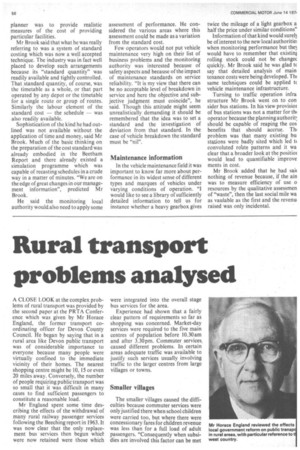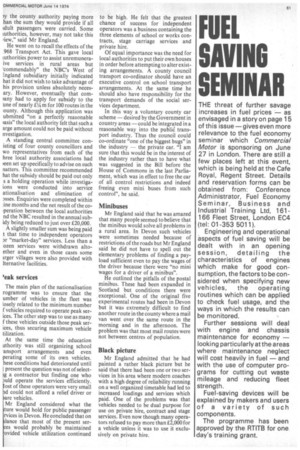Rural transport problems analysed
Page 58

Page 63

If you've noticed an error in this article please click here to report it so we can fix it.
A CLOSE LOOK at the complex problems of rural transport was provided by the second paper at the PRTA Conference which was given by Mr Horace England, the former transport coordinating officer for Devon County Council. He began by saying that in a rural area like Devon public transport was of considerable importance to everyone because many people were virtually confined to the immediate vicinity of their homes. The nearest shopping centre might be 10, 15 or even 20 miles away. Conversely, the number of people requiring public transport was so small that it was difficult in many cases to find sufficient passengers to constitute a reasonable load.
Mr England spent some time describing the effects of the withdrawal of many rural railway passenger services following the Beeching report in 1963. It was now clear that the only replacement bus services then begun whict were now retained were those which were integrated into the overall stage bus services for the area.
Experience had shown that a fairly clear pattern of requirements so far as shopping was concerned. Market-day services were required to the five main centres of population before 10.30am and after 3.30pm. Commuter services, caused different problems. In certain areas adequate traffic was available to justify such services usually involving traffic to the larger centres from large villages or towns.
Smaller villages
The smaller villages caused the difficulties because commuter services were only justified there when school children were carried too, but where there were concessionary fares for children revenue was less than for a full load of adult passengers. "Consequently when subsidies are involved this factor can be met ))./ the county authority paying more han the sum they would provide if all Ault passengers were carried. Some iuthorities, however, may not take this dew," said Mr England.
He went on to recall the effects of the 968 Transport Act. This gave local iuthorities power to assist unremuneraive services in rural areas but .commendably" the NBC's West of 'ingland subsidiary initially indicated hat it did not wish to take advantage of his provision unless absolutely neces ary. However, eventually that cornrany had to apply for subsidy to the une of nearly £1/4 m for 100 routes in the .ounty. Although this application was ubmitted "on a perfectly reasonable rasis" the local authority felt that such a arge amount could not be paid without nvestigation.
A standing central committee conisting of four county councillors and wo representatives from each of the hree local authority associations had teen set up specifically to advise on such natters. This committee recommended hat the subsidy should be paid out only s a holding operation while investigaions were conducted into service ationalisation and elimination of 3sses. Enquiries were completed within Me months and the net result of the coperation between the local authorities nd the NBC resulted in the annual subidy being reduced to just over £20,000. A slightly smaller sum was being paid t that time to independent operators )r "market-day" services. Less than a ozen services were withdrawn altoether and even in those cases some irger villages were also provided with Iternative facilities.
'eak services
The main plan of the nationalisation rogramme was to ensure that the umber of vehicles in the fleet was losely related to the minimum number f vehicles required to operate peak serices. The other step was to use as many I these vehicles outside those peak serices, thus securing maximum vehicle tilization.
At the same time the education uthority was still organizing school unsport arrangements and even perating some of its own vehicles. hese conditions had deteriorated until present the question was not of select g a contractor but finding one who uld operate the services efficiently. ost of these operators were very small d could not afford a relief driver or are vehicles.
Mr England considered what the ture would hold for public passenger rvices in Devon. He concluded that on lance that most of the present ser • es would probably be maintained ovided vehicle utilization continued to be high. He felt that the greatest chance of success for independent operators was a business containing the three elements of school or works contracts, stage carriage services and private hire.
Of equal importance was the need for local authorities to put their own houses in order before attempting to alter existing arrangements. A county council transport co-ordinator should have an executive control on school transport arrangements. At the same time he should also have responsibility for the transport demands of the social services department.
In this way a voluntary county car scheme — desired by the Government in country areas —could be integrated in a reasonable way into the publiC transport industry. Thus the council could co-ordinate "one of the biggest bugs" in the industry — the private car. "I am sure that this would be in the interest of the industry rather than to have what was suggested in the Bill before the House of Commons in the last Parliament, which was in effect to free the car of all control restrictions and indeed freeing even mini buses from such control", he said.
Minibuses
Mr England said that he was amazed that many people seemed to believe that the minibus would solve all problems in a rural area. In Devon such vehicles were sometimes needed because of restrictions of the roads but Mr England said he did not have to spell out the elementary problems of finding a payload sufficient even to pay the wages of the driver because there were "no mini wages for a driver of a minibus".
He outlined the pitfalls of the postal minibus. These had been expanded in Scotland but conditions there were exceptional. One of the original five experimental routes had been in Devon but it was extremely difficult to find another route in the county where a mail van went over the same route in the morning and in the afternoon. The problem was that most mail routes were not between centres of population.
Black picture
Mr England admitted that he had painted a rather black picture but he said that there had been one or two services in his area where modern coaches with a high degree of reliability running on a well organized timetable had led to increased loadings and services which paid. One of the problems was that vehicles needed to be dual purpose for use on private hire, contract and stage services. Even now though many operators refused to pay more than £2,000 for a vehicle unless it was to use it exclusively on private hire.




























































































































